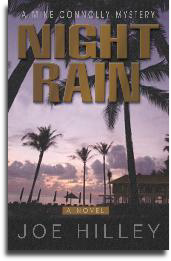



gripping tale will hold your attention and keep you guessing.
An infectiously
intriguing
who-done-it.
Stacy Oliver,
ChristianBook
Reviews.com

Darkness stared back through the window pane at Dibber Landry as a howling gale ripped through the night, driving sheets of rain against the house. Thick, black darkness punctuated by momentary flashes of lightning so bright it made him jump. In the bursts of light he could see the house next door and the one beyond it. He wasn’t supposed to. For as long as he could remember they had been blocked from view by a stand of pine trees with trunks larger than the reach of two men. That he could see past the edge of the yard meant only one thing. The trees lay on the ground, splintered and ruined.
He smiled. The trees were down. That was a good sign.
Dibber moved away from the window and eased into a worn and tattered recliner. Around him the house shuddered, resisting with all its might the hurricane’s attempts to smash it to splinters, too. Dibber pushed back with his hands against the arms of the chair. A footrest popped out as the chair reclined. He propped up his feet, folded his hands across his lap, and closed his eyes. Better rest a while. Before long, the eye of the storm would pass overhead. Then there would be work to do.
An hour or two later the wind died away. The house, still cloaked in darkness, became quiet and still. Dibber’s eyes popped open. He sat up, awake and alert.
“The eye,” he whispered.
He hauled himself up from the chair and hurried across the room to the door and stepped outside to the porch.
Around him the night air was thick and humid. Rainwater dripped from the eaves of the house in a steady, rhythmic cadence. Above him, stars shone bright against the dark sky but as he scanned the horizon there was not a light to be seen in any direction.
A broad grin spread across his face.
“Power’s out all over the island.”
From the porch, Dibber moved down the steps to the yard and started across to the dock. Even
without a light he knew how to find it. He’d been there thousands of times. On the mantle in the house there was a picture of him in his daddy’s arms, standing near the end of the dock, looking across the pass to Heron Bay. But that was a long time ago. Before that day his aunt came and took him out of school. He remembered her bloodshot eyes and the way her red nose dripped. She took him by the hand and led him outside under the oak trees on the playground. They sat on the swings, the ones with the big, thick chains that hung down with bottoms made of rubber cut from Mr. Vann’s old truck tires. They sat there for a long time, her staring at the ground, him staring at her – and then she told him. A carload of kids skipping school. The car swerved across the road. Hit his daddy’s pickup. He was seven. In Mrs. Williams’ second grade class. It was as far back as he could remember.
But his feet remembered. They took him through the night to the dock without need of conscious thought. In less than a minute, he felt the toe of his sneaker strike the first board. He reached into the darkness with his left hand for the first piling, a telephone pole driven into the ground where the yard ended and the dock began. His hand found it without searching. He moved forward with a confident stride.
Twelve paces out, he knelt at the first cleat and found the line that was wound around it. He grasped the line and gave it a tug. By then, his eyes had adjusted to the darkness and he could see the faint outline of the boat. Two-thirds full of water, but it had survived the first half of the storm without sinking. He steadied himself against the dock and stepped into the boat.
One side of the boat was tethered bow and stern to the dock. The other side was tied to large pilings that had been driven into the muddy bottom just far enough away from the dock to allow a boat to slip between them. Dibber opened a storage compartment in the bow of the boat, took out a five-gallon bucket and started bailing water. In no time at all he scooped out most of it and untied the boat from the pilings. Freed from its mooring, he pushed the boat back with his hands, walking it hand over hand away from the dock. When it was clear, he moved behind the steering wheel. The boat rocked from side to side in the waves. Water sloshed around his ankles. He felt along the console for the switch, then pressed a button beside the steering wheel. The engine turned over. Once. Twice. Then came to life.
With a quick scan of the shoreline, Dibber turned the wheel and gunned the engine. The boat started across the water.
There on the leeward side of the island the waves were not too large, but still the boat struggled to climb over them and wallowed from crest to crest. He glanced over his shoulder toward the engine. The water that had been around his feet had moved to the back and splashed against the transom. He slowed the boat and flipped a switch for the bilge pump.
Minutes later, he made the west end of the island and turned south toward the open water of the Gulf. As he rounded the island the boat plunged headlong into six foot waves. The first one crashed over the bow of the boat, sending spray into the air and drenching Dibber to the bone. He tossed back his head and laughed out loud.
When he was past the end of the island he turned east and followed the shore along the southern side. To the left the hulking remains of mangled beach houses lurked in the shadows. What remained of their frames stood just above the water that flooded the western half of the island.
A satisfied grin stretched across Dibber’s face. He slowed the engine and surveyed the damage.
A Category Three hurricane, the storm had pushed a wall of water ahead of it, sending the Gulf across the beach and running the surf all the way to Bienville Boulevard. Many of the beach houses were gone, swept away as the storm blew ashore. Most of the ones that remained were severely damaged.
Dibber scanned along the shoreline, then focused on a small frame house that stood on pilings a few feet above the water. It was damaged, but seemed to be intact. He turned the boat toward it and slowed the engine to an idle. Waves coming from behind carried him forward. As the boat picked up speed, he nudged the throttle and used the engine to keep it pointed in the right direction.
Just before it would have slammed into the pilings, Dibber shoved the engine in reverse and pushed the throttle all the way forward. The engine screamed as it revved to full power. The prop churned the water and dug in against the waves. Pilings that supported the house loomed ahead. Closer and closer they came. Then, at the last moment, the engine overcame the momentum of the waves and backed the boat away.
Dibber pulled the throttle back and slowed the engine. He bumped the shifter with the heel of his hand and knocked it out of gear. The boat came to a stop, then drifted beneath the house. Dibber ducked to avoid banging his head on the floor joists that passed above him.
From a compartment beneath the steering wheel he took out a spotlight and flipped it on, shinning it at an angle toward the water to reduce the chances of being seen by anyone crazy enough to ride out the storm in the neighboring houses. With his free hand, he grasped one of the floor joists to steady the boat.
“Water must be up seven … eight feet.”
In the glare of the light he could see pieces of boards and bits of debris sloshing in the chocolate brown water around the boat. A jet ski bobbed a few feet away. He worked the boat in that direction, grabbed the jet ski, and tied it to the stern with a heavy rope.
In the far corner was a storage closet. The door flopped back and forth with the waves. He pushed the boat over to it and held open the door. Inside, the tops of several fishing rods poked out above the water. He pulled the first one up and found a Shimano reel attached to the other end.
With a freshwater bath and a little oil it would be good as new. He laid the rod and reel in a rack along the gunnel of the boat. Three more rods were in the closet. He took them, along with a tackle box from a shelf above the water.
When he’d emptied the closet, he moved the boat from underneath the house to a stairway on the side facing the road. He tied the bow to the railing and took a large flashlight from beneath a seat along one side of the boat. Steadying himself against the railing, he put one foot on the bottom rung and tested it to make sure the steps would hold his weight. Satisfied it wouldn’t give way, he shifted his weight and swung free of the boat.
The steps led up to a landing at a door to the house. When he reached the top, Dibber leaned his weight against the door and pushed. It didn’t budge. He tried again, but it still didn’t open. Then he stepped back and gave it a hard kick. The bolt of the lock tore through the facing as the door flew open and crashed against the wall on the inside. Dibber stepped inside and found himself standing in the kitchen.
To the right was a refrigerator and sink. Further around was a stove. A counter top separated the kitchen from the living room. Across the living room, a large sliding glass door offered a view of the beach. A sofa sat facing the view with chairs on either end. Between the sofa and the counter, a hallway opened to the right through the center of the house. Dibber moved around the end of the counter top and started up the hall. A few feet from the living room he came to a bedroom on the left. He leaned through the doorway and glanced inside.
In the center of the room was a bare bed frame. Across from it was a dresser. There was a closet in the corner. He moved around the bed frame and opened the closet door. The closet was empty. Not even a hanger. He stepped back to the dresser and opened the top drawer. There was nothing inside it, either. Frustrated, he turned to the door.
At the end of the hall was a second bedroom. Along the wall by the door was a dresser. A bed sat to the right. Blankets and sheets on the bed were wadded and tossed in a mess. On the dresser top was a wooden box. Next to it was a blue vase. Scattered around them were bits of paper, loose change, and pieces of this and that deposited there from pockets and purses over time. He raked through it with his finger, picking up loose change as he moved things around. With the flick of a wrist, he sent a can of spray deodorant tumbling to the floor. Behind it he found a class ring. He picked it up and held it between his fingers. In the glare of the light he could see the inscription.
“Class of 1985.”
It was heavy. Maybe gold. He bounced it in the palm of his hand, then put it in his pocket.
In the corner of the room beyond the dresser was a closet. The door was ajar and inside he could see there were clothes still on hangers. Holding the light with one hand, he racked the clothes aside with the other. Behind them he found an automatic shotgun leaning against the wall. He picked it up and held it under the light. Convinced it was in good shape, he tossed it on the bed behind him, then turned back to check the shelf above.
Near the front was a shoe box. He took it down and knocked the top off with the flashlight. In it were pictures and a handful of seashells. He dropped the box on the floor and ran his hand back over the shelf. A pair of boots. A folded sweatshirt. Behind them was a cigar box. He took it down and raised the lid. Inside was a one-inch stack of twenty dollar bills bound with a rubber band.
“Bingo.”
Dibber took a seat on the bed and set the box in his lap. He took the money out, fanned through it with his thumb, then shoved it in his pants pocket.
Beneath the money, the box was stuffed with thin, rectangular pieces of paper. In the glow of the flashlight he could see they were money order receipts. The ones on top were made payable to Southern Nursery Supply, but near the bottom he found one that caught his eye. He took it from the box for a closer look.
The money order had been purchased at the Snack In A Bag, a convenience store on Halls Mill
Road. Whoever filled it out had included the name of the person who bought it in the lower left
corner. As his lips whispered the name, his heart sank. He knew the …
Bam!
Below him, the boat banged against the steps. He glanced out the window. The stars were gone. The wind was picking up again. The eye of the storm was moving past. In a few minutes the back half would hit, and it would be the worst part. He closed the box, slipped it inside his shirt, and turned for the shotgun. As he reached for it, the beam of the flashlight swept across the bed. Two eyes peered at him from the tangled folds of the sheets.
Dibber gasped.
The eyes were open wide, the face around them fixed in a look of terror. Dibber stared, unable to move, unable to breathe.
Bam!
The boat banged against the steps once more. Dibber caught his breath and darted toward the door.





